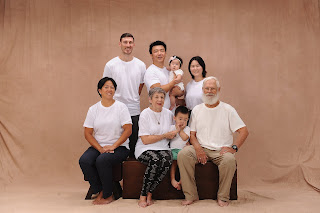BEFORE
ADOPTION: CHILDLESS MOTHER, MOTHERLESS
CHILD
Somewhere a mother
starts in the
night –
did her baby cry
across the
darkworld?
She hugs the
emptiness,
asks the stars
Where is the lost one?
Somewhere a baby
cries
waits
scans the eyes
around her
looking for a
reply.
Now, she is her
own baby.
Where is the loving one?
Somewhere a mother
waits
wonders
papers a wall
sews a quilt
calls the
officials –benefactors, malefactors –
Where is the little one?
Thin foreign paper
rustles
like bamboo in the
wind.
It says
The baby murmurs to herself,
is healthy,
would smile at her mother.
Like tremors under
the earth
the murmurs start,
they grow, they
travel,
reverberate along
the Mindanao Deep,
against the stars
and back to earth.
Both mothers hear.
We three are bound
together:
three souls, six empty hands
woven together across
earth, sky, and water,
tissue of atoms and molecules
of patience, of sorrow,
of love.
That is a poem I wrote in 1980 or 1981, while awaiting the arrival of my daughter Sulae, from Korea. It seemed that every conceivable delay had developed, which ended with me finally writing not only my congress people, but the President. We had hoped that she would make it for her first birthday, but she missed it by a couple of weeks. The entire process had taken almost two years. I would do it all again.
Even then, there was some negativity around international adoptions. Lately, I have read and viewed opinion pieces in which both grown adoptees and other cultural commentators have attacked the practice of international adoption. The main complaint from adoptees is that they were raised as if white in places where there were few or no people who looked like them. Cultural arbiters from the origin or adoptive countries lament that the children are raised without 'knowing their culture.' Some adoptees have returned to Korea or their other places of origin to find that they don't fit there, either. Others move to urban centers in their adoptive country to find more of 'their own.' None of these observations are without merit.
When we adopted Sulae and later, her little brother, Kori, we were mindful of the fact that they would be part of an anomalous family. However, they also became part of what to my mind is a rather typically Californian family: two step-siblings and later, another who was the product of my husband's high-school romance and who became part of our family as an adult. We were mindful of the fact that we lived where there were many Asian families so the children wouldn't be unique in that regard. And the second of our two adoption agencies, Holt, was stringent in its inquiries as to how we would acquaint ourselves and our children (all of them) with aspects of their home culture.
Here is where I stand. Most research shows that the most important years of a child's life, as far as acquiring social skills, language skills, and intellectual skills, are the first few. A child may grow in the culture of his native country and become seriously stunted because of cold institutional care (think of Romania). But a child who grows up loved, valued, and confident, can research his original culture if (s)he wishes when older. So I value love over cultural correctness or political correctness.
We did do our best to acquaint our adoptees and their siblings and their teachers and classmates with the culture of Korea, as we learned and understood it. For the most part, while the children liked the poetry lessons I did in classrooms about Korea, they like all the other poetry lessons as well. We belonged to a couple of groups of families with international adoptees, which held picnics and other get-togethers so the children could mingle with others who 'looked like them.' At the last of these we attended, our children ran into some neighbor children and abandoned their co-adoptees to play with kids they knew.
As they grew, we encouraged them to learn about their home country, and assured them that they were free to research their birth parents. So far, neither of them has, although I am encouraging one to do so for health information. Probably the best thing we did for them was to take them to the Philippines for several years while we taught and they studied at an international school there. Most people looked like them and they could usually spot us in a crowd, although we couldn't find them. That's when we gave in and got cell phones - but I digress. The two Korean adoptees have friends from around the world with whom they are still in touch. Our son lives in Korea, where he went to teach, with his beautiful Korean wife and our two adorable grandchildren. Our daughter lives in South Carolina with her Southern husband, who has traveled with our family to Korea where he won immediate fans for his prodigious appreciation of the excellent Korean seafood.
All of our children are independent and productive. They love us and we think they are the best. I don't take a lot of credit for that - we had great material to work with and we didn't screw it up. They love and support each other. I'm grateful for all of my family. I've been trying to learn Korean for about five years, but so far Korean is winning. I'll keep trying. What am I planning to do as soon as we can? This summer, we're visiting our older son and younger daughter, in the Carolinas. As soon as possible, we're going to Korea. We adopted two babies who became Korean-Americans. Now we are becoming American-Koreans. So, love and culture. But love first.

